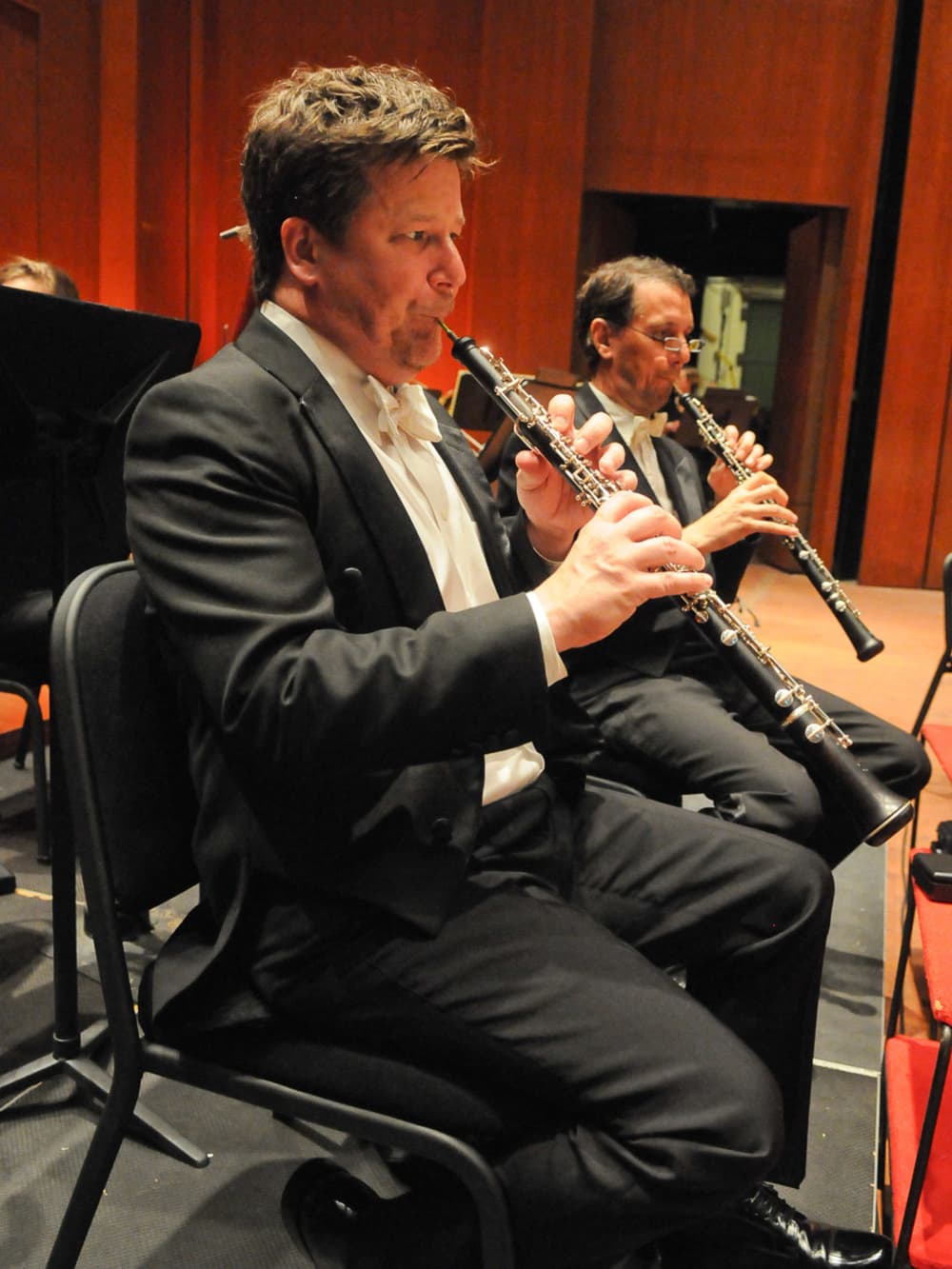Welcome to H-Town!
Symphony's new principal oboist is surprised to discover a hipper, moredog-friendly Houston
 Jonathan Fischer, 44, is the newest member of the Houston Symphony's windsection. As principal oboe, his sound will toll the start of each and everyHouston Symphony concert.Photo by Daniel Ortiz
Jonathan Fischer, 44, is the newest member of the Houston Symphony's windsection. As principal oboe, his sound will toll the start of each and everyHouston Symphony concert.Photo by Daniel Ortiz Jonathan Fischer is thrilled to perform Brahms' Symphony No. 1, Debussy's La Merand Mahler's Symphony No. 2 at the end of the season.Photo by Daniel Ortiz
Jonathan Fischer is thrilled to perform Brahms' Symphony No. 1, Debussy's La Merand Mahler's Symphony No. 2 at the end of the season.Photo by Daniel Ortiz The Houston Symphony had two national auditions, though the search committeedidn't hire anyone from those. Then, there was a smaller invitational auditionfor eight candidates. From that, they offered Fischer a trial week. After that,he was offered the job.Photo by Daniel Ortiz
The Houston Symphony had two national auditions, though the search committeedidn't hire anyone from those. Then, there was a smaller invitational auditionfor eight candidates. From that, they offered Fischer a trial week. After that,he was offered the job.Photo by Daniel Ortiz
There's a new sound tolling in the woodwind section of the Houston Symphony, one that's impossible to miss. It's the rich, reverberant, clear pitch that aligns the orchestra in tone and timber before each and every performance, the Concert A that segues the cacophony of musicians warming up, leading up to the silence before the first down beat.
When long-time principal oboist Robert Atherholt announced that he would retire from his post, one that he held since 1984, Houston Symphony disciples felt a sense of loss, that somehow things wouldn't be the same without this high-class artist's signature voice.
For those who pay close attention, there was an oboe ringer during RachFest's final week in January. That would have been Jonathan Fischer, former associate principal oboe with the San Francisco Symphony. He was on trial for the important spot.
Fischer is the chosen man for the job and has already performed his first Houston Symphony concert run.
Yet prior to playing his first solos as the official double reed divo, CultureMap sat down with this genteel — and hilarious — Southern gent after his third rehearsal with the large ensemble.
In the comfort of the cozy and stylish Jones Hall green room, we chatted about moving from San Francisco to Houston, about his legendary mentor at the Curtis Institute of Music and his search for a bluegrass banjo coach.
CultureMap: People think of San Francisco as one of the most beautiful cities in the country — the place to be. Weather is perfect, the terrain is gorgeous. And Houston is thought of as being a hot, humid, hell zone.
Jonathan Fischer: A lot of people have asked me, "What are you doing?"
"Squat and blow, as some like to say (laughs). . . blow and move your fingers."
CM: Exactly. Why did you leave your position as associate principal in San Francisco to come here?
My position in San Francisco was associate principal oboe; I came here for the opportunity to be principal. When you are the principal you choose the repertoire you play. (The rest is performed by the associate.)
When you are in music conservatory, preparing for orchestral life and taking auditions, you spend hours perfecting orchestral excerpts. These are eight- to 16-bar passages that are short. You practice them over and over again — some of which I've been practicing for more than 20 years. And there's a long list of these excerpts that I've never played concert.
Now that I have a principal position, I will have the opportunity to play them — starting with Brahms' Symphony No. 1.
That I'm 44 years old and have never played principal on the Brahms, well that just breaks my heart.
Now I get to play Brahms, so it better be good, right?
CM: Right. Though Brahms is very sensitive to intonation. Tell me, how do you approach performing with a group you hardly know? Isn't this officially your third rehearsal?
JF: Yes, third rehearsal.
If you ask a flight attendant how they cope with an air crisis — like when the US Airways Flight 1549 landed on the Hudson River — they all say that you fall back on your training. You do what you've been told to do and follow along what the manual says. It's automatic; you do it.
So you sit back in your chair and think to yourself: I am a well-trained, highly-skilled, professional musician and I am going to do what I've been trained to do. You rely on that training. At the end of the day, you have to just play your part and focus on task at hand.
Squat and blow, as some like to say (laughs). . . blow and move your fingers.
"I grew up in the South — I was born in South Carolina but grew up in North Carolina — so I love the Southern vibe, the oak trees that shade the streets, the friendliness of the people."
When you get nervous and you freak out while wondering if this note is going to speak just right, if it will be in tune with the flute, if it's going to be the right color, you can work yourself into a frazzle.
CM: What are you most excited about playing this year?
JF: I thought it was serendipitous that the season started with Brahms' Symphony No. 1 since it was one of those hallmark pieces that I've always wanted to perform. Debussy's La Mer is a big deal for oboe and a colorful work for the orchestra. And of course Mahler's Symphony No. 2 at the end of the season.
CM: How does someone win a job like Houston Symphony's principal oboe spot?
JF: It was a long and drawn out procedure. The Houston Symphony had two national auditions in the course of a year or two; the search committee didn't hire anyone from those. Then, there was a smaller invitational audition for eight candidates. From that, they offered me a trial week. So I came back to perform as part of RachFest. After that, I was offered the job.
CM: Was location a consideration when accepting this position?
JF: Music jobs are so few and far between, and principal oboe jobs don't come around every day. It really doesn't matter where the job is; that's such a secondary consideration for musicians. You basically go where the work is. If that positions happens to be in Houston or in San Francisco, so be it.
But I am really pleasantly surprised by Houston. It's so much hipper than people think.
CM: I know; we don't have the greatest reputation out there.
JF: And I think there are more museums in Houston than San Francisco?
I grew up in the South — I was born in South Carolina but grew up in North Carolina — so I love the Southern vibe, the oak trees that shade the streets, the friendliness of the people. Houston is also much more cosmopolitan than I expected it to be. I've heard people speaking all kinds of languages just walking down the street. It's very diverse; much more sophisticated than I thought it would be before I moved here.
CM: How are your reeds?
"If it's sharp, how musical is it, really? If the tone was beautiful but the playing was boring, then how was the tone beautiful? If it was boring, that includes the tone. It's all part of the same thing — all or nothing."
JF: How are my reeds? Oh, my gosh. Reeds hate dry weather, and reeds love humidity. That means so far, so good.
The climate here is stable; the difference between summer and winter isn't huge. It's not like it's 95 degrees in the summer and 20 below zero in the winter, like it is in the Midwest. Or super dry in the winter and humid in the summer. The change is more moderate.
If I were to play principal in the Anchorage Symphony, that would be a problem.
CM: Let's talk about your oboe lineage. You are a Curtis graduate, a school with a long tradition of training the country's — the world's — leading oboists. Among them John de Lancie, John Mack, New York Philharmonic's Liang Wang, Kathy Greenbank and your teacher, Richard Woodhams, principal of the Philadelphia Orchestra.
I remember being a student at the Aspen Music Festival and School rehearsing Strauss' Don Juan — I was playing second flute. After the first octave leap of the infamous oboe solo, the conductor stopped to correct something in the strings. That low D to middle D interval — two notes — earned an orchestral clap.
Two notes. That's all it took to wow other musicians.
Woodhams is one of those rare, legendary artists that can play and teach, and his studio puts out exceptional talent. Why and how is that?
JF: For me — I have not heard other Curtis graduates say it this way — the most important thing he imparted on me, and I don't have a succinct way of saying this, begins with how people listen to music.
When people say, that person was sharp, but very musical; or they had a beautiful tone, but it was boring; what they are doing is categorizing different aspects of playing, like musicality, intonation, tone color, rhythm, expression and so on. And that's the way I thought before I studied at Curtis.
With Woodhams, those were all one thing — each just as important as the other.
If it's sharp, how musical is it, really? If the tone was beautiful but the playing was boring, then how was the tone beautiful? If it was boring, that includes the tone. It's all part of the same thing — all or nothing. If one of those aspects is missing, the whole thing isn't good enough.
I don't think he made an effort to impart that on me; I took that from my time with him.
He demanded perfection in each lesson, and perfection meant all those categories. If one of them wasn't there, it ruined the others. It's either right or it's wrong. That was clear with Woodhams. His was a holistic approach to playing the oboe.
What he did make an effort to impart on me was a cross-disciplinary awareness between art forms. He is well read and aware of history and traditions, and what was happening at the time each piece was written. He though it was very important for us to cultivate an appreciation for art and literature. He would talk about that a lot in our lessons, especially how the arts informed one another.
CM: What about your interests outside of classical music?
JF: I have two dogs. I have a mutt Labrador and a retired greyhound. I am having fun exploring things to do in Houston with them — and I found the city to be super dog friendly.
What else do I do? I make oboe reeds . . .
I also play bluegrass banjo, though I am looking for a local teacher.
I listen to a lot of podcasts — about current events, history, historical non-fiction, state of the world sort of programs — and bluegrass. I love the 49 Specials, a San Francisco indie band, and The Avett Brothers. I am big bookworm, though I hardly ever read fiction.
